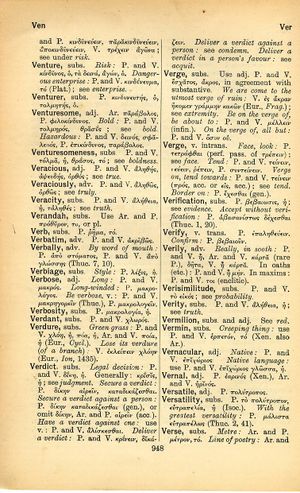verge: Difference between revisions
From LSJ
(Woodhouse 5) |
(CSV5) |
||
| Line 1: | Line 1: | ||
{{ | {{Woodhouse1 | ||
| | |Text=[[File:woodhouse_948.jpg|thumb|link={{filepath:woodhouse_948.jpg}}]]'''subs.''' | ||
Use adj. P. and V. [[ἔσχατος]], [[ἄκρος]], in agreement with substantive. | |||
<b class="b2">We are come to the utmost verge of ruin</b>: V. ἐς ἄκραν ἥκομεν γράμμην κακῶν (Eur., <b class="b2">Frag.</b>); see [[extremity]]. | |||
<b class="b2">Be on the verge of be about to</b>: P. and V. μέλλειν (infin.). | |||
<b class="b2">On the verge of, all but</b>: P. and V. ὅσον οὐ. | |||
'''v. intrans.''' | |||
<b class="b2">Face, look</b>: P. τετράφθαι (perf. pass. of τρέπειν); see [[face]]. | |||
<b class="b2">Tend</b>: P. and V. τείνειν, νεύειν, ῥέπειν, P. συντείνειν. | |||
<b class="b2">Verge on, tend towards</b>: P. and V. τείνειν ([[πρός]], acc. or εἰς, acc.); see [[tend]]. | |||
<b class="b2">Border on</b>: P. ἔχεσθαι (gen.). | |||
}} | }} | ||
Revision as of 10:09, 21 July 2017
English > Greek (Woodhouse)
subs.
Use adj. P. and V. ἔσχατος, ἄκρος, in agreement with substantive.
We are come to the utmost verge of ruin: V. ἐς ἄκραν ἥκομεν γράμμην κακῶν (Eur., Frag.); see extremity.
Be on the verge of be about to: P. and V. μέλλειν (infin.).
On the verge of, all but: P. and V. ὅσον οὐ.
v. intrans.
Face, look: P. τετράφθαι (perf. pass. of τρέπειν); see face.
Tend: P. and V. τείνειν, νεύειν, ῥέπειν, P. συντείνειν.
Verge on, tend towards: P. and V. τείνειν (πρός, acc. or εἰς, acc.); see tend.
Border on: P. ἔχεσθαι (gen.).

